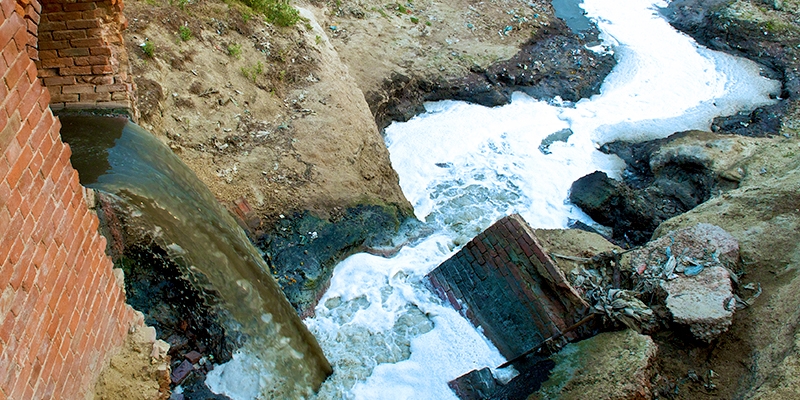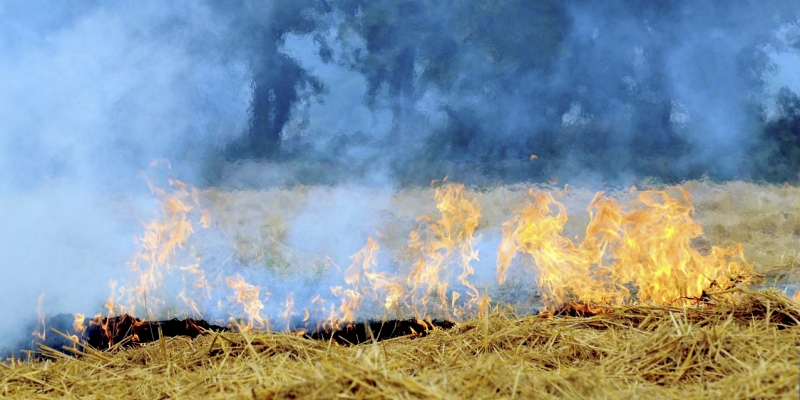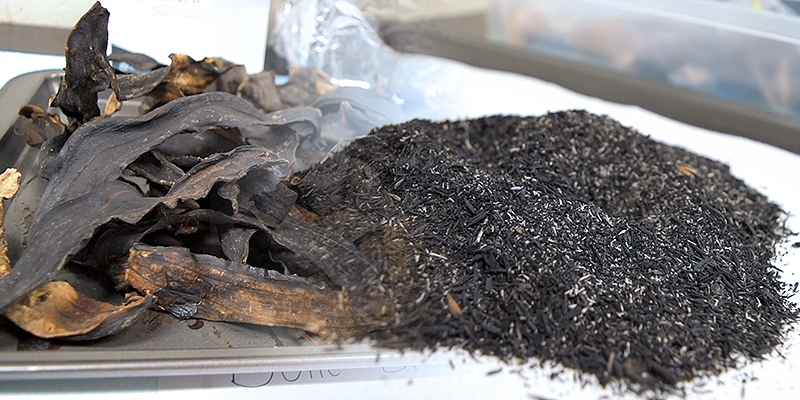Before being released into open water bodies, municipal wastewater is often treated to remove harmful suspended solids and lower the biological oxygen demand. However, wastewater may still contain substantial amounts of heavy metals even after these primary and secondary treatments.
Dr. Prasher and his team have developed a unique method to remove heavy metals from wastewater using agricultural waste. The researchers use biochar, a carbon rich material produced by burning leftover rice husks and plantain peels. The end result is a material that is highly absorptive and can be used as a passive, wastewater treatment solution.
 Ineffective Removal of Wastewater Contaminates
Ineffective Removal of Wastewater ContaminatesMany wastewater treatment plants were not designed to remove emerging contaminants and small amounts of these sources can lead to significant concerns. While many contaminants can be biologically or chemically degraded, heavy metals accumulate and become extremely toxic.
The release of these contaminates becomes even more significant when untreated, raw sewage is released into open waters. In Canada, major metropolitan cities such as Victoria, Montreal, and Halifax have released untreated sewage into open waters in recent years due to wastewater treatment issues and heavy rains.
Dr. Prasher remembers viewing the harsh reality of the problem during a previous visit in India. “I saw the black, untreated sewage water merge into a larger river that could affect the residents living downstream who use the river as a source for drinking water,” he recalled.
 Using Waste as a Resource
Using Waste as a ResourceRice husks, rice straw, and plantain peels are a large source of agricultural waste in India. After rice fields are harvested much of the remaining material is burned. Farmers require a vast amount of diesel to properly harvest and cultivate the field again – burning the field is an easier solution.
“Driving in the early morning or evening, you can see all of these fields on fire and smoke billowing,” said Dr. Prasher. The process kills useful microflora in soil and contributes to local air pollution. “Technically it’s against the law but everyone is doing it.”
Dr. Prasher is helping eliminate this process by producing biochar with the remaining agricultural waste. Biochar, a fancy term for charcoal, is produced by burning biomass without open flames in controlled environments. The end result is a new material produced from waste that is highly absorptive and can be used in a variety of ways. It is a stable, carbon positive material that can be incorporated in agricultural fields and can last for several decades.
After constructing a pilot-scale pyrolyzer in his lab to burn biomass, Dr. Prasher and his team collected leftover rice husks and plantain peels and produced a variety of biochars. Biochar absorptive properties can vary widely depending on the source material used, the burning temperature, and the length of “cook time.”
Dr. Prasher envisions the biochar being used as “floating islands” in wastewater streams or small rivers. The material can be placed in jute bags or tanks and can passively remove heavy metals and other contaminants as water passes through them. They can also be combined with plants for added phytoremediation functions and improved aesthetics.
 A Global Endeavour
A Global EndeavourDr. Prasher and his research team at McGill obtained a variety of rice husks from Arkansas to produce 6 different biochars. Meanwhile his partner researchers at the University of Guelph are using the same source material to create hydrochar – a form of biochar that is created at lower temperatures and is less energy intensive. The biochars and hydrochars are then sent to collaborating Indian researchers at Lovely Professional University where they are testing the effectiveness of both materials.
Other partner researchers at Amrita University are studying the microbial properties of the material. Their findings will providing insight into a second application of biochar – applying biochar filters to slow sand filters. Slow sand filters can be used by rural communities to remove water contaminates, the addition of biochar and the bacterial colonies present in these filters can help make the removal process more effective.
The project also has the support of additional academic, industrial and community partners, including the Assembly of First Nations, the Punjab Pollution Control Board, BioAge Equipment, Firmenich, Columbia University, and others.
By using waste as a resource, biochar is a very simple solution to wastewater contamination with minimal costs and a high level of impact. Dr. Prasher and his IC-IMPACTS project is helping introduce a sustainable technology that is very effective and can be easily implemented in communities across Canada, India, and beyond.
2024 IC-IMPACTS Conference in Delhi December 9 - 11, 2024 New Delhi, India